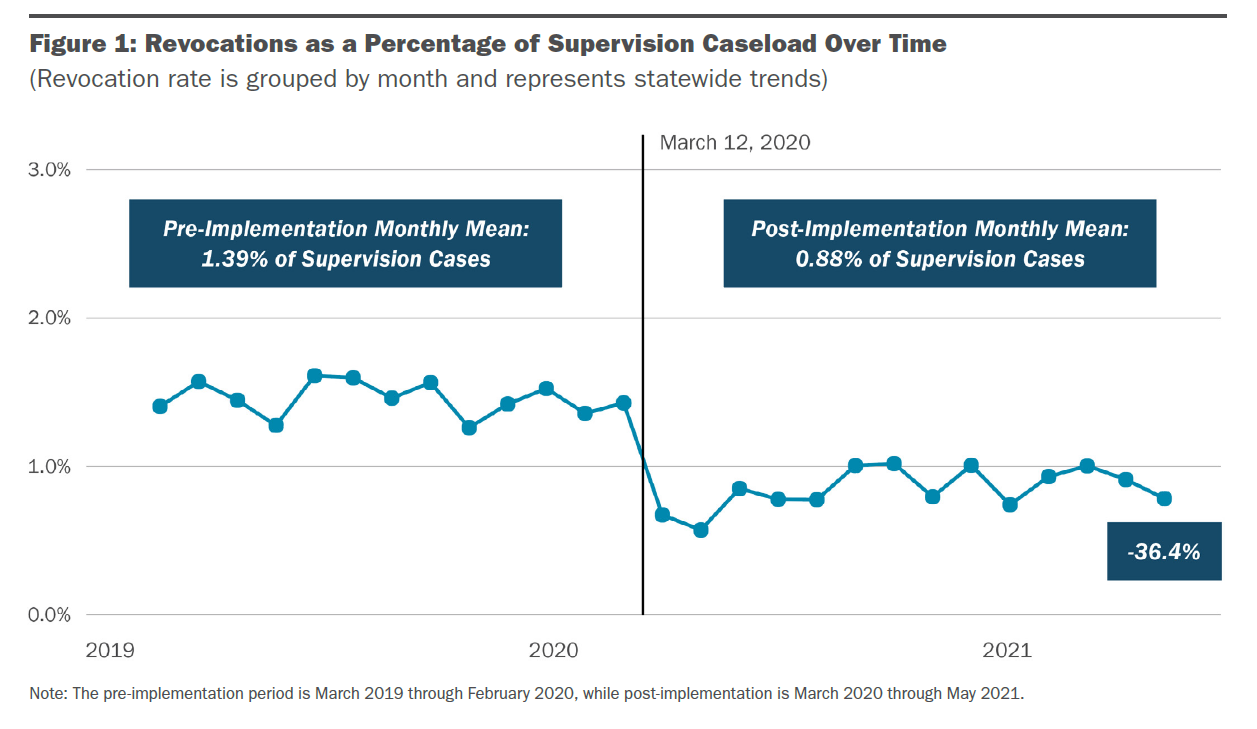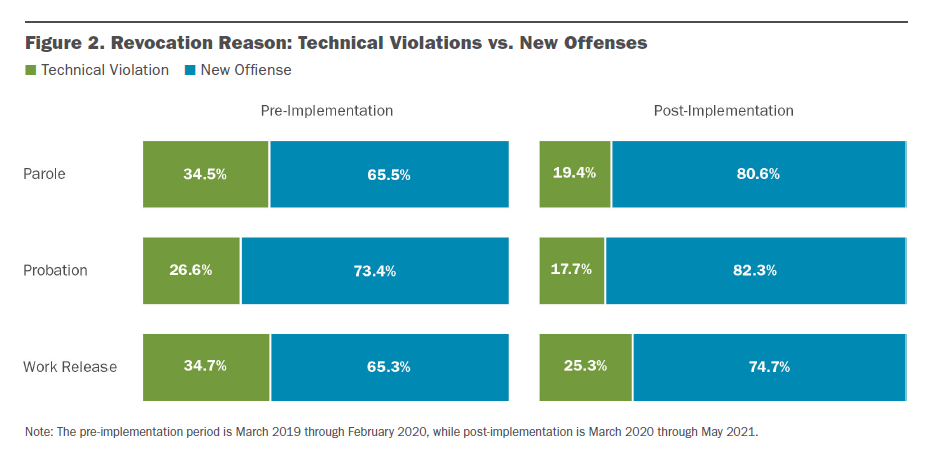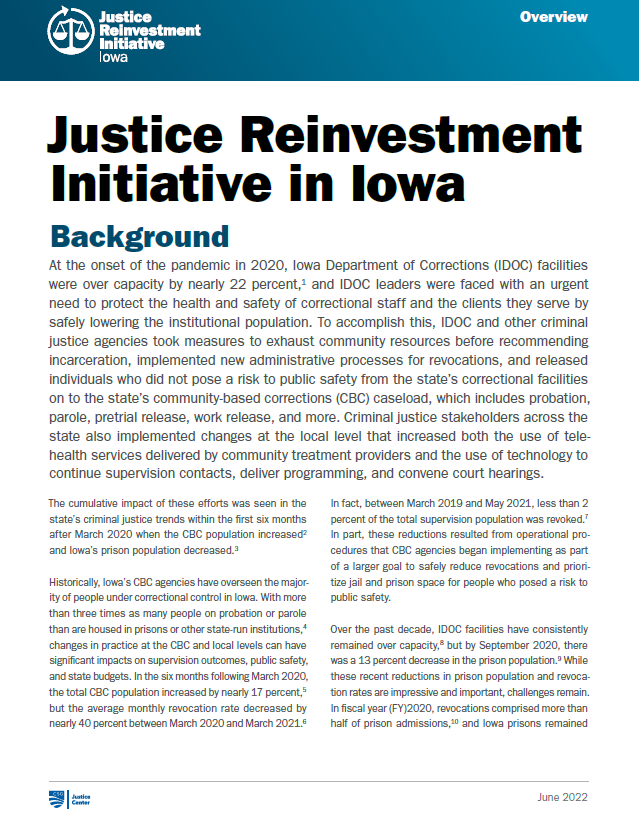Justice Reinvestment Initiative in Iowa
Justice Reinvestment Initiative in Iowa
This overview highlights changes in recent criminal justice trends since the implementation of pandemic-related responses by criminal justice stakeholders in Iowa and describes what the Justice Reinvestment Initiative process will entail in the state.
Background
At the onset of the pandemic in 2020, Iowa Department of Corrections (IDOC) facilities were over capacity by nearly 22 percent,1 and IDOC leaders were faced with an urgent need to protect the health and safety of correctional staff and the clients they serve by safely lowering the institutional population. To accomplish this, IDOC and other criminal justice agencies took measures to exhaust community resources before recommending incarceration, implemented new administrative processes for revocations, and released individuals who did not pose a risk to public safety from the state’s correctional facilities on to the state’s community-based corrections (CBC) caseload, which includes probation, parole, pretrial release, work release, and more. Criminal justice stakeholders across the state also implemented changes at the local level that increased both the use of telehealth services delivered by community treatment providers and the use of technology to continue supervision contacts, deliver programming, and convene court hearings.
The cumulative impact of these efforts was seen in the state’s criminal justice trends within the first six months after March 2020 when the CBC population increased² and Iowa’s prison population decreased.3
Historically, Iowa’s CBC agencies have overseen the majority of people under correctional control in Iowa. With more than three times as many people on probation or parole than are housed in prisons or other state-run institutions,4 changes in practice at the CBC and local levels can have significant impacts on supervision outcomes, public safety, and state budgets. In the six months following March 2020, the total CBC population increased by nearly 17 percent,5 but the average monthly revocation rate decreased by nearly 40 percent between March 2020 and March 2021.6
In fact, between March 2019 and May 2021, less than 2 percent of the total supervision population was revoked.7 In part, these reductions resulted from operational procedures that CBC agencies began implementing as part of a larger goal to safely reduce revocations and prioritize jail and prison space for people who posed a risk to public safety.
Over the past decade, IDOC facilities have consistently remained over capacity,8 but by September 2020, there was a 13 percent decrease in the prison population.9 While these recent reductions in prison population and revocation rates are impressive and important, challenges remain. In fiscal year (FY)2020, revocations comprised more than half of prison admissions,10 and Iowa prisons remained nearly 20 percent over capacity.11 April 2022 population data show that facilities are slowly rebounding to early 2020 levels.12 If the prison population continues to grow, current projections estimate that IDOC facilities will be nearly 22 percent over capacity by the end of FY2030.13
The recent upward trend in both prison and CBC populations will create more challenges for state budgets while potentially posing a risk to the health and safety of staff and the clients they serve. As a result, Iowa is one of the first states in the country to attempt to answer a critical criminal justice question: what were the impacts of the state’s public health decisions during the pandemic on its criminal justice system and public safety? IDOC leadership and Governor Kim Reynolds are also interested in identifying where the state can build upon those efforts to further ensure that people are effectively supervised in the community without compromising public safety or health.
In the spring of 2021, 12 Iowa leaders, including Governor Kim Reynolds, Senator Dan Dawson, Senator Todd Taylor, Representative Gary Worthan, and the eight judicial district directors of Departments of Correctional Services, requested support from the U.S. Department of Justice’s Office of Justice Programs, Bureau of Justice Assistance (BJA) and The Pew Charitable Trusts (Pew) to use a bipartisan, interbranch group of leaders to conduct an extensive analysis of available data, a comprehensive assessment of community supervision practices, and engagement of criminal justice stakeholders across the state. BJA and Pew approved Iowa state leaders’ request and asked The Council of State Governments (CSG) Justice Center to partner with state leaders to use the Justice Reinvestment Initiative (JRI) approach to answer the following questions:
1. Have recent changes that were implemented in response to the pandemic had a positive, negative, or neutral impact on public safety and CBC operations?
2. Should IDOC and CBC agencies continue or enhance these new procedures to increase staff’s ability to successfully supervise individuals in the community?
3. Do IDOC and CBC need any specific resources or better procedures (training, technology, treatment services, etc.) to successfully supervise individuals in the community?
4. To maximize potential benefits and resources, what data-driven recommendations (administrative or legislative) may be needed to improve clients’ chances of success in the community?
With guidance from a newly created interbranch group of criminal justice stakeholders in Iowa (hereafter referred to as “the Oversight Committee”), CSG Justice Center staff are conducting a targeted analysis of Iowa’s criminal justice responses implemented after March 2020 to understand the potential impact on public safety and CBC operations. To build a picture of statewide criminal justice trends after March 2020, CSG Justice Center staff are seeking case-level administrative data from courts and IDOC. CSG Justice Center staff are also convening focus groups and interviewing key stakeholders in Iowa’s criminal justice system to understand criminal justice responses. Based on the findings from these quantitative and qualitative analyses and input from CSG Justice Center staff, the Oversight Committee will develop data-driven recommendations to chart a path forward. Findings from this project could help shift the national culture of community supervision by highlighting promising practices that focus criminal justice resources on preserving effective community supervision and promoting client success.
This overview highlights changes in recent criminal justice trends since the implementation of pandemic-related responses by criminal justice stakeholders in Iowa. Information presented here is based on publicly available data from IDOC, the Iowa Justice Data Warehouse, the Federal Bureau of Investigation’s Uniform Crime Reporting Program, and case level data analyzed by the CSG Justice Center.
Criminal Justice System Trends in Iowa
Iowa’s efforts to maintain public health and safety after March 2020 lowered projected operating costs and initially decreased the prison population,14 but IDOC facilities are now rebounding and will challenge state budgets while potentially posing a risk to the health and safety of staff and clients.
■ Between FY2019 and FY2020, most admissions to prison decreased by at least 13 percent; however, admissions for parole revocations slightly increased by 4 percent.15
■ The overall number of prison releases between FY2019 and FY2020 remained steady, but the number of releases to parole increased by 18 percent, while releases to work release decreased by 15 percent.16
■ In the first six months after March 2020, the prison population decreased by 13 percent, from 8,519 people in the third quarter of FY2020 to 7,412 in the first quarter of FY2021.17
■ Since March 2020, the prison population has slowly begun to rebound to pre-March 2020 levels. April 2022 data show that the IDOC prison population is now 8,411 people, which means IDOC prisons are nearly 20 percent over capacity.18
Iowa’s CBC agencies oversee the majority of people under correctional control in Iowa, and the CBC population is increasing.19
■ From 2011 to 2020, the CBC population has remained three to four times the size of the prison population.20
■ Between FY2019 and FY2020, new admissions to both CBC field and residential services21 decreased across most admission types; however, new admissions for the parole population increased by 19.5 percent.22
■ In the first six months following March 2020, the CBC population—including all supervision types—increased nearly 17 percent, from 30,093 people in March 2020 to 35,250 at the end of September 2020.23
■ As of April 2022, the CBC population—including all supervision types—has increased to 39,170 people and is nearly 30 percent larger than it was in March 2020.24
Despite CBC operational procedures that are achieving revocation-reduction and sentence completion goals, supervision revocations still accounted for more than half of all prison admissions in FY2020.25
■ Between July 2018 and December 2021, more than half of CBC cases were closed successfully.26
■ Between March 2019 and May 2021, less than 2 percent of the supervision population was revoked. However, supervision revocations still accounted for most prison admissions.27
■ Between March 2020 and May 2021, the average monthly revocation rate decreased by nearly 40 percent (see Figure 1).28
■ When compared to pre-March 2020 levels, revocations due to technical violations declined at a higher rate than those due to new arrests; more than 75 percent of revocations in 2020 were driven by new offenses (see Figure 2).29


The Justice Reinvestment Initiative Approach
Analyze data and develop recommendations
Under the direction of the Oversight Committee, CSG Justice Center staff are conducting a comprehensive analysis of case-level sentencing, probation, parole, and incarceration data. The analyses will result in findings related to the effectiveness of recent efforts to reduce revocations and maintain public safety.
This analysis will examine the impact of reducing revocations on public safety. However, establishing causality between revocation-reduction efforts and public safety outcomes is complex because IDOC’s efforts were adopted amid many other changes, including the pandemic and its associated effects on mobility, travel patterns, employment, education delivery, and access to health care. A descriptive analysis alone can conflate all these changes and produce biased estimates of the effect of IDOC’s revocation-reduction efforts, so to understand which part of the differences in public safety outcomes are due to changes in IDOC’s revocation practices, CSG Justice Center staff will use more complex statistical methods.
To incorporate perspectives and recommendations from individuals impacted by efforts to reduce recidivism and maintain public safety, CSG Justice Center staff are gathering input from IDOC staff, law enforcement, county attorneys, judges, supervision line officers and supervisors, judicial district directors, victims and their advocates, people who are on community supervision and their advocates, local officials, and others.
With the assistance of CSG Justice Center staff, the Oversight Committee will review the analysis and develop data-driven administrative and/or legislative recommendations focused on increasing public safety and reducing recidivism. Recommendations will be available in fall 2022.
Endnotes
1. Analysis of Iowa Department of Corrections data conducted by The Council of State Governments Justice Center, February 1, 2022.
2. “Quarterly Quick Facts, September 30, 2021,” Iowa Department of Corrections, accessed October 31, 2021, https://doc.iowa.gov/quick-facts.
3. Ibid.
4. Iowa Department of Corrections, FY2011–FY2020 Annual Reports (Des Moines, IA: Iowa Department of Corrections, 2011–2020).
5. “Quarterly Quick Facts, September 30, 2021.”
6. Analysis of Iowa Department of Corrections data conducted by The Council of State Governments Justice Center, February 1, 2022.
7. Ibid.
8. Iowa Department of Corrections, FY2011–FY2020 Annual Reports.
9. “Quarterly Quick Facts, September 30, 2021.”
10. Iowa Department of Corrections, FY2020 Annual Report (Des Moines, IA: Iowa Department of Corrections, 2020).
11. “Daily Statistics,” Iowa Department of Corrections, accessed April 26, 2022, https://doc.iowa.gov/daily-statistics.
12. Ibid.
13. Iowa Department of Human Rights, Division of Criminal and Juvenile Justice Planning, The Correctional Policy Project Iowa Prison-Population Forecast FY 2020–FY 2030 (Des Moines, IA: Iowa Department of Human Rights, Division of Criminal and Juvenile Justice Planning 2020).
14. Iowa Department of Human Rights, Division of Criminal and Juvenile Justice Planning, The Correctional Policy Project Iowa Prison-Population Forecast FY 2018–FY 2028 (Des Moines, IA: Iowa Department of Human Rights, Division of Criminal and Juvenile Justice Planning 2018); Iowa Department of Human Rights, Division of Criminal and Juvenile Justice Planning, The Correctional Policy Project Iowa Prison-Population Forecast FY 2020–FY 2030; “Quarterly Quick Facts, September 30, 2021.”
15. Iowa Department of Corrections, FY2019 Annual Report (Des Moines, IA: Iowa Department of Corrections, 2019); Iowa Department of Corrections, FY2020 Annual Report (Des Moines, IA: Iowa Department of Corrections, 2020).
16. Ibid.
17. “Quarterly Quick Facts, September 30, 2021.”
18. “Daily Statistics.”
19. Ibid.
20. Iowa Department of Corrections, FY2011–FY2020 Annual Reports.
21. CBC field services include individuals who are on community-based supervision. Supervision may involve electronic monitoring and referrals to correctional programs, local treatment providers, and other resources as appropriate. CBC residential services supervise higher-risk clients who require enhanced supervision; short-term placements are also offered for people under supervision in the community.
22. Iowa Department of Corrections, FY2019 Annual Report (Des Moines, IA: Iowa Department of Corrections, 2019); Iowa Department of Corrections, FY2020 Annual Report.
23. “Quarterly Quick Facts, September 30, 2021”
24. Analysis of Iowa Department of Corrections data conducted by The Council of State Governments Justice Center, April 26, 2022; “Daily Statistics.”
25. Iowa Department of Corrections, FY2020 Annual Report.
26. “Quarterly Quick Facts, September 30, 2021.”
27. Analysis of Iowa Department of Corrections data conducted by The Council of State Governments Justice Center, February 1, 2022.
28. Ibid.
29. Ibid.
Project Contact
Greg Halls, Senior Policy Analyst, ghalls@csg.org
Project credits:
Writing: Greg Halls, Alison Martin, CSG Justice Center
Research: Andrew Byrum, Jessica Saunders, Rebecca Cohen, CSG Justice Center
Advising: Grace Beil Call, Ellen Whelan-Wuest, CSG Justice Center
Editing: Leslie Griffin, CSG Justice Center
Public Affairs: Brenna Callahan, CSG Justice Center
Web Development: Catherine Allary, CSG Justice Center
This project was supported by Grant No. 2019-ZB-BX-K002 awarded by the Bureau of Justice Assistance. The Bureau of Justice Assistance is a component of the Department of Justice’s Office of Justice Programs, which also includes the Bureau of Justice Statistics, the National Institute of Justice, the Office of Juvenile Justice and Delinquency Prevention, the Office for Victims of Crime, and the SMART Office. Points of view or opinions in this document are those of the author and do not necessarily represent the official position or policies of the U.S. Department of Justice.

The Council of State Governments (CSG) Justice Center is a national nonprofit organization that serves policymakers at the local, state, and federal levels from all branches of government. The CSG Justice Center’s work in justice reinvestment is done in partnership with The Pew Charitable Trusts and the U.S. Department of Justice’s Bureau of Justice Assistance. These efforts have provided data-driven analyses and policy options to policymakers in 26 states. For additional information about Justice Reinvestment, please visit csgjusticecenter.org/jr/.

Research and analysis described in this report has been funded in part by The Pew Charitable Trusts public safety performance project. Since 2005, The Pew Charitable Trusts and its partners have conducted research, provided technical assistance and legislative support to governments, and made strategic grants to advance fiscally sound, data-driven criminal and juvenile justice policies and practices that protect public safety and reduce correctional populations and costs. To learn more about the project, please visit pewtrusts.org/publicsafety.
About the authors


Arkansas policymakers have long expressed concerns about the state’s high recidivism rate. Over the past 10 years, an…
Read MoreIn April 2025, Arkansas Governor Sarah Huckabee Sanders signed a package of bipartisan criminal justice legislation into law,…
Read More Explainer: Key Findings and Options from Arkansas’s Justice Reinvestment Initiative
Explainer: Key Findings and Options from Arkansas’s Justice Reinvestment Initiative
Arkansas policymakers have long expressed concerns about the state’s high recidivism rate.…
Read More Explainer: How a New Law in Arkansas Tackles Crime, Recidivism, and Community Supervision Challenges
Explainer: How a New Law in Arkansas Tackles Crime, Recidivism, and Community Supervision Challenges
In April 2025, Arkansas Governor Sarah Huckabee Sanders signed a package of…
Read More










